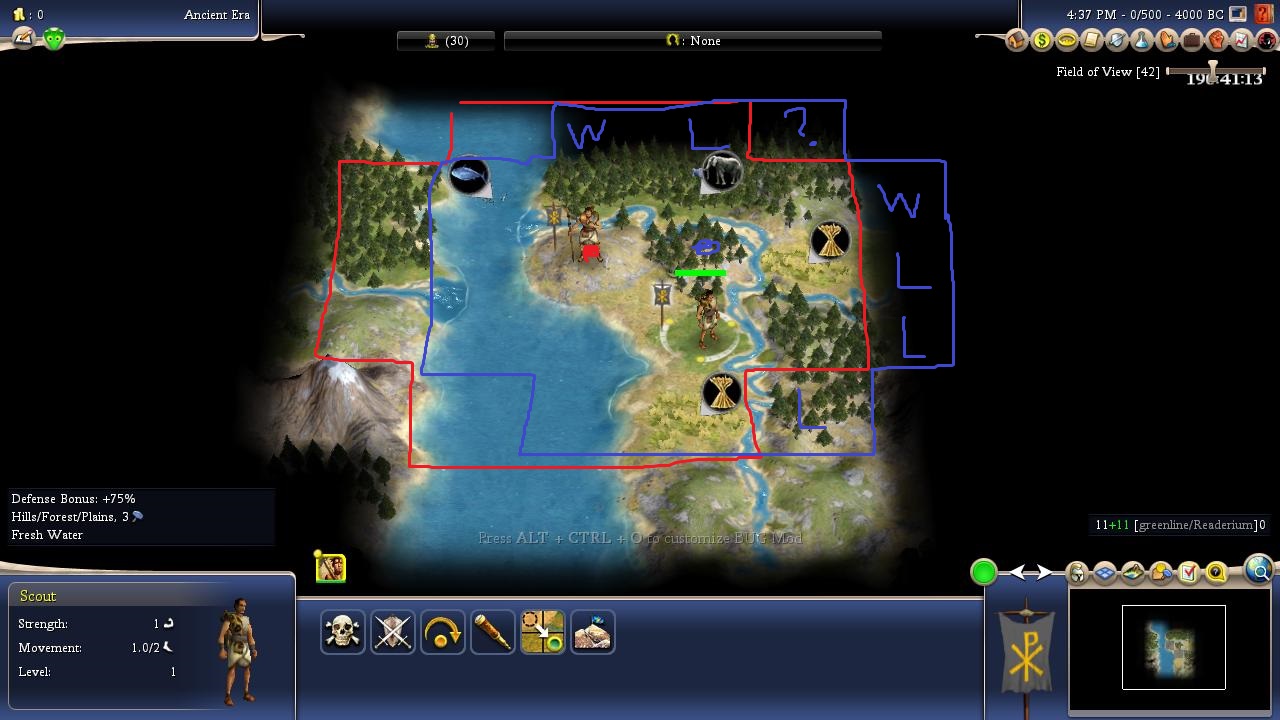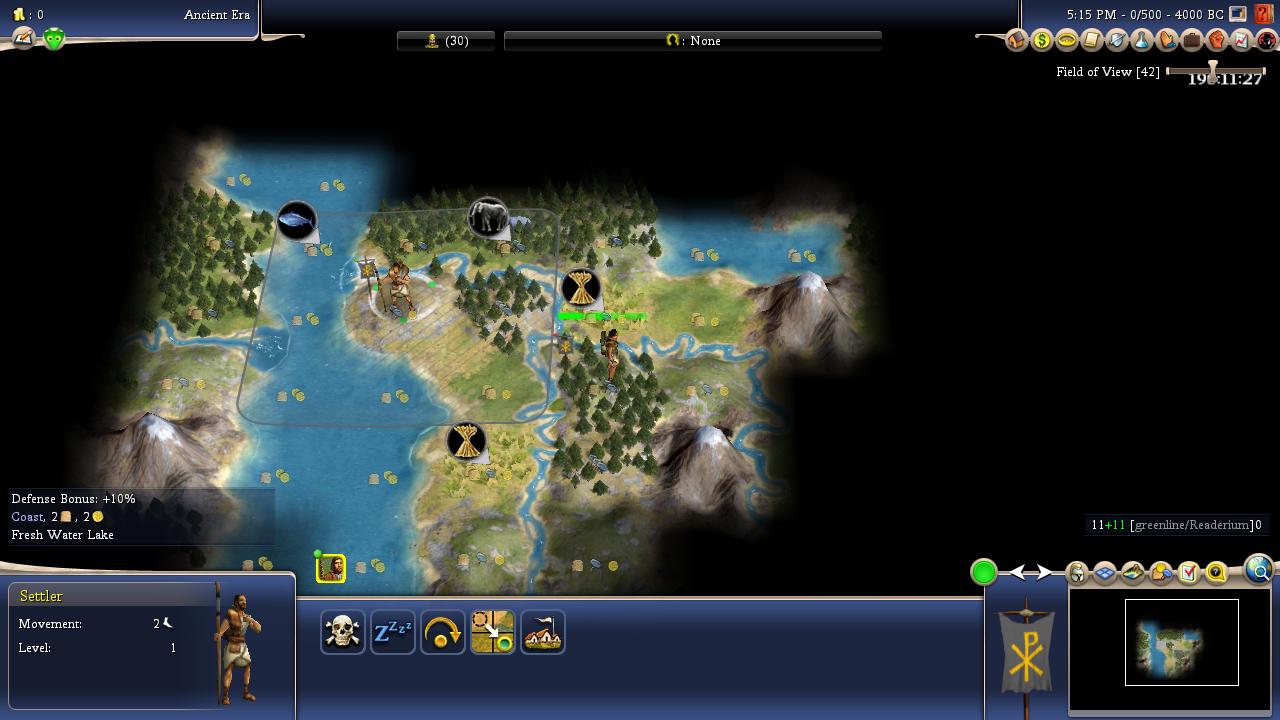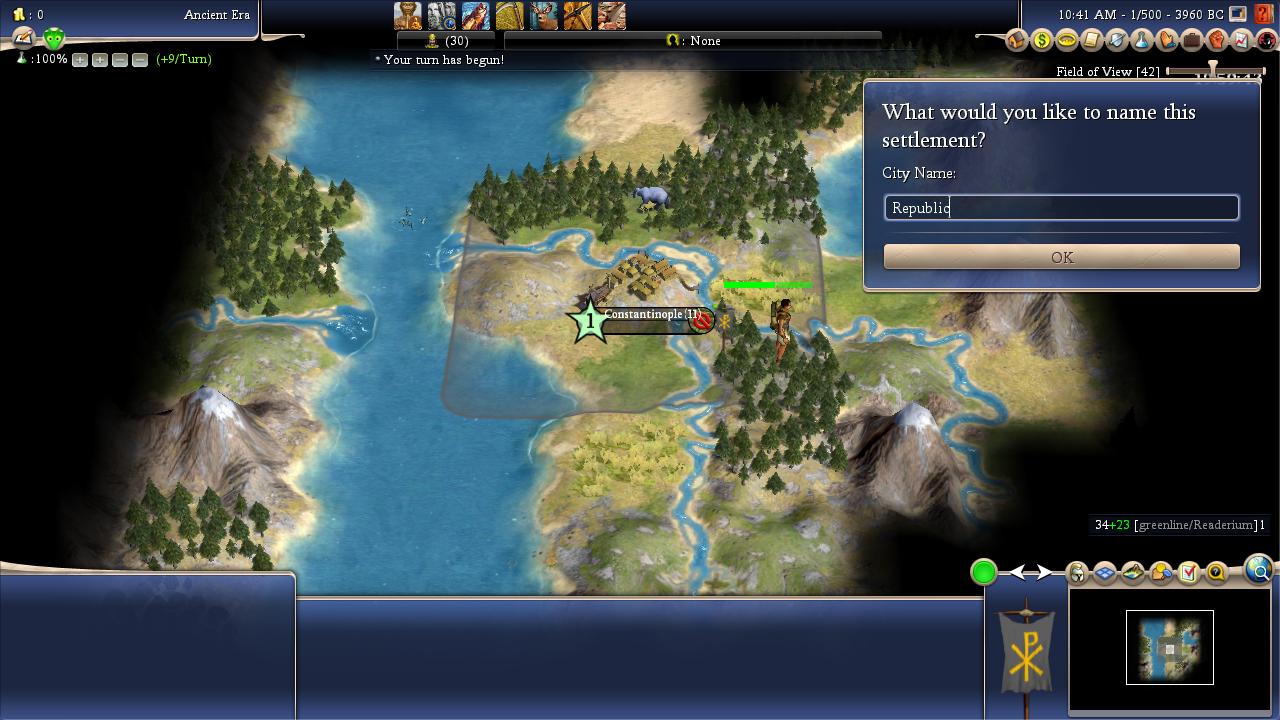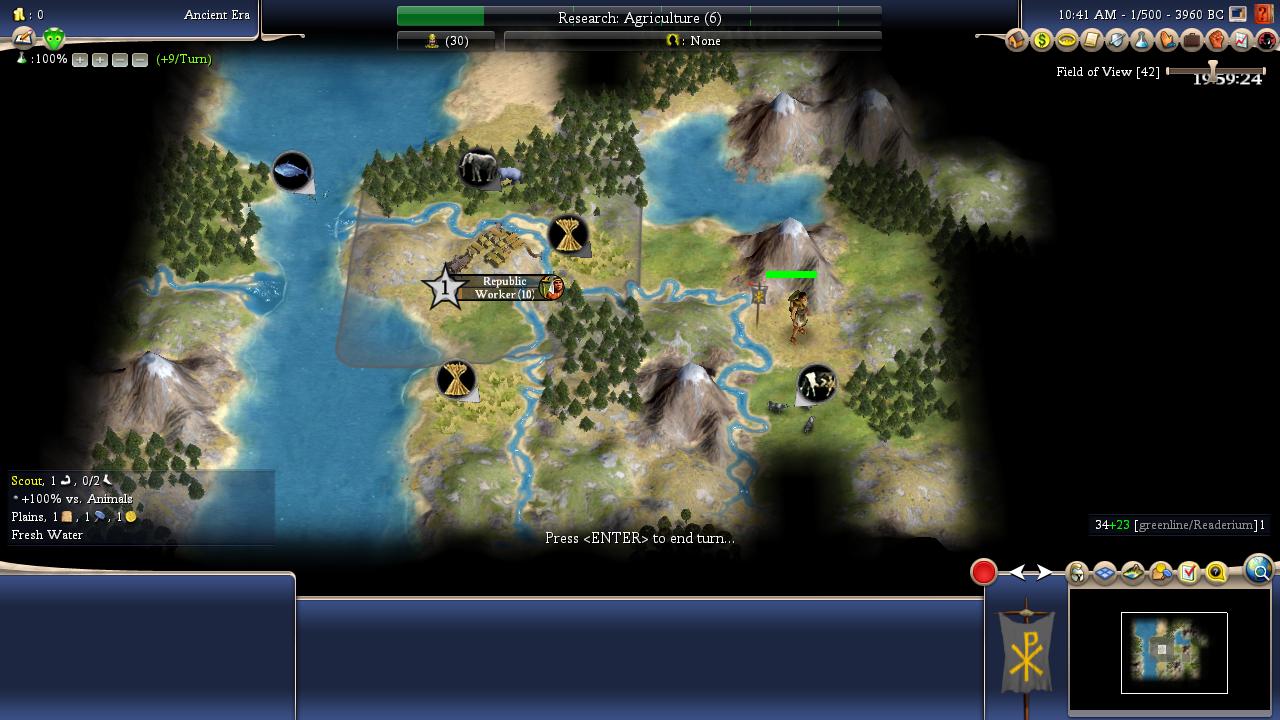Posts: 2,062
Threads: 20
Joined: Dec 2014
Password is going to be 'bandraw'.
Tarkeel, I'm not going to be available to play turns on the 22nd and 23rd - could you step in and play for me while I am gone? Should just be moving the scout around unless we blitz through a turn of turns in the next few days.
Posts: 4,572
Threads: 31
Joined: Nov 2016
I'm probably leaving a few days after that, so should be able to cover.
Posts: 2,062
Threads: 20
Joined: Dec 2014
Since it looks like the city gifting thing was fixed, we can begin:

Can everyone see the screenshot? still using dropbox and they change the rules all the time.
I moved the scout SE. from the tile bleeding, it seems like moving the settler 1E will pick up more water than I hoped. But it still looks like the best move. I assume the scout would go NE?
June 18th, 2023, 16:01
(This post was last modified: June 18th, 2023, 16:02 by greenline.)
Posts: 2,062
Threads: 20
Joined: Dec 2014

Red dot is SIP. Blue dot pulls in an extra land tile, possible two or three and keeps the same amount of known resources. Even if our copper is on the other side of this lake, it would still be a PITA to hook. I think the clear way to go is to move 1E. The worst that would happen is orphaning a seafood.
Posts: 2,062
Threads: 20
Joined: Dec 2014
Moved the scout and this pushed me much further on the capital move:

That water that would be picked up on the west is a lake. So that's going to be a lot better longer term, and short term the capital still has plenty of good tiles to work. I really do not want to try and have to improve those three land tiles across the water when trying to go for bureaucracy.
Sorry if I'm playing a bit in a rush here. Just been waiting a while for the game to start and I am hoping to start blitzing the early turns. I will wait for your say on whether to move the capital or not, but to me it seems like a slam dunk.
June 19th, 2023, 00:20
(This post was last modified: June 19th, 2023, 00:21 by Tarkeel.)
Posts: 4,572
Threads: 31
Joined: Nov 2016
(June 18th, 2023, 15:50)greenline Wrote: 
Can everyone see the screenshot? still using dropbox and they change the rules all the time.
This one doesn't show, the others do.
(June 18th, 2023, 16:01)greenline Wrote: 
Red dot is SIP. Blue dot pulls in an extra land tile, possible two or three and keeps the same amount of known resources. Even if our copper is on the other side of this lake, it would still be a PITA to hook. I think the clear way to go is to move 1E. The worst that would happen is orphaning a seafood.
I did consider the other plains hill to the SE, but the E one looks just straight up better.
BTW, are you going to do C&D stuff?
Posts: 2,062
Threads: 20
Joined: Dec 2014
Not that interested in doing C&D by myself. I always paled at the amount of work involved compared to the returns. I think it'd be worth doing on a tiny map, but I think for this setup I'd rather dump all my EPs into Xist's power graph and call it quits. Unless you know of an easier way to do C&D besides how Sullla did it ages ago.
Played a double turn as I was the last to play. Hoping I won't be holding things up now that the main thing is just scouting + playing out the worker plan.

Kicking off the naming scheme, the capital is named after Plato's Republic. This was a book that I read on its own, instead of as part of an academic course or a solo venture to learn philosophy. I imagine this may have my interpretation and praise of the book sound different to how people usually experience it.
The worst and most inescapable flaw of the book one will find is that time and the evolution of language leaves it difficult to parse. Like all surviving literature from classical and ancient Greece, things rarely translate well to English, and what once was probably snappier and richer prose can't help but be ponderous and inelegant to a modern reader. The beginning section is especially highlights this quality, as it involves building up a bunch of analogies and then tearing them down, analogies that were probably much more commonplace in Athens at the time then they are today.
But I think Republic is well worth pressing forward with, despite those aged analogies and arguments forming such a barrier to entry. Going further, you see Plato (writing as Socrates) then proceed to talk about his version of a utopian state, and how it would derive from a utopian class structure. Plato is often credited as one of the first people to write a vision of a utopian society, but he would certainly be far from the last to do so. What I particularly enjoyed about Plato's utopian sermon is twofold. First, one cannot escape from his motivation for seeking such a utopia. Plato wrote Republic and his other dialogues around the time of the Peloponnesian War, when Athens briefly reached the height of its power - but also then began its inexorable decline from the center of the Greek world to a city that would only be conquered and conquered again throughout the ages. The concern Plato has for wanting a better world is not merely fantasizing about how things should be better for their own sake, but (at least, to my eyes) is brought on by a genuine anxiety that the systems as they functioned for Athens were taking it down a road whose destination was ugly and unavoidable without drastic change. This change never happened, of course, and after ultimately losing the tussle with Sparta, Athens would find itself weak and unable to recover, ever again.
Besides that, the next thing Plato does in the book after describing his perfect society is to then describe how it would inevitably fail. The passage of time erodes all things, and Plato was wise enough to understand that there really can't be a perfect system - even when still trying to work at the task of making one!
The passage about the men in the cave, a now famous concept that has been applied to many other works, is something I still find that very much captures the imagination. It's not common that great philosophers are also great writers - indeed, it's often the case that great philosophers are terrible writers. If you're going to read Republic and find yourself not liking the text, at least stick around for that section.
I've had friends say that most of Plato's writings are inferior to those of Aristotle. When I do get around to reading Aristotle, I may come to the same conclusion. But even then, it is obvious that Aristotle was standing on the shoulders of giants.
June 19th, 2023, 10:11
(This post was last modified: June 19th, 2023, 10:11 by greenline.)
Posts: 2,062
Threads: 20
Joined: Dec 2014
As for the other civ stuff of this turn, I think it made sense to move the scout away from that ugly desert for now - we'll probably settle in that direction later. Found a cow in this fertile river valley:

A city here would make some sense as a second city. It shares a wheat and has a lot of green tiles to work, and the river jumpstarts a PRO trade route with little roading required. The only concern is that it will take some time to get to AH with the tech path - need to go Agri -> Mining -> BW and then possibly fishing before AH is possible. So it might make sense to go south first and then this can be city #3.
Posts: 4,572
Threads: 31
Joined: Nov 2016
(June 19th, 2023, 10:07)greenline Wrote: Not that interested in doing C&D by myself. I always paled at the amount of work involved compared to the returns. I think it'd be worth doing on a tiny map, but I think for this setup I'd rather dump all my EPs into Xist's power graph and call it quits. Unless you know of an easier way to do C&D besides how Sullla did it ages ago.
I've done it on some openings where I was particularly bored or had a plan that could be foiled. Basically it's down to tracking what demographics are each turn, trying to decipher which values belong to which players. Score increases also tell a tale of what's going on.
(June 19th, 2023, 10:11)greenline Wrote: As for the other civ stuff of this turn, I think it made sense to move the scout away from that ugly desert for now - we'll probably settle in that direction later. Found a cow in this fertile river valley:

A city here would make some sense as a second city. It shares a wheat and has a lot of green tiles to work, and the river jumpstarts a PRO trade route with little roading required. The only concern is that it will take some time to get to AH with the tech path - need to go Agri -> Mining -> BW and then possibly fishing before AH is possible. So it might make sense to go south first and then this can be city #3.
I like that cow, but not sure where it's best to pick it up from: the plainshill SW of it could also be an option. I prefer to scout in a circle first, as city sites are best evaluated as a group. I'll probably log in to have a look around when we have some more map knowledge.
Suggest the scout goes S-SW next.
As for Plato's Republic, I failed a course in philosophical history in part because I called Plato stupid. Not quite using those words, but I did describe his "theory of gravity" as "the rock falls because it falls".
Posts: 2,062
Threads: 20
Joined: Dec 2014
(June 19th, 2023, 11:26)Tarkeel Wrote: I've done it on some openings where I was particularly bored or had a plan that could be foiled. Basically it's down to tracking what demographics are each turn, trying to decipher which values belong to which players. Score increases also tell a tale of what's going on.
I like that cow, but not sure where it's best to pick it up from: the plainshill SW of it could also be an option. I prefer to scout in a circle first, as city sites are best evaluated as a group. I'll probably log in to have a look around when we have some more map knowledge.
Suggest the scout goes S-SW next.
I'll grab a demographics screenshot from this turn and the later ones. I suppose it can't hurt to be on the lookout for any early Praet / chariot buildups.
Quote:As for Plato's Republic, I failed a course in philosophical history in part because I called Plato stupid. Not quite using those words, but I did describe his "theory of gravity" as "the rock falls because it falls".
What's interesting to me is that our knowledge of gravity have really not advanced that far from Plato's primitive view. Newton's law of universal gravitation gives parameters and predictions for how the rock will fall, but at the end of the day, the reason for universal gravity existed is still arbitrary. The rock is attracted to the Earth just because it is. For universal relativity, spacetime curves with mass because it just does. There are theories of quantum gravity that predict some kind of gravity particle, like the electron was found for electricity, but to my knowledge, it has not been actually found as of yet.
|



